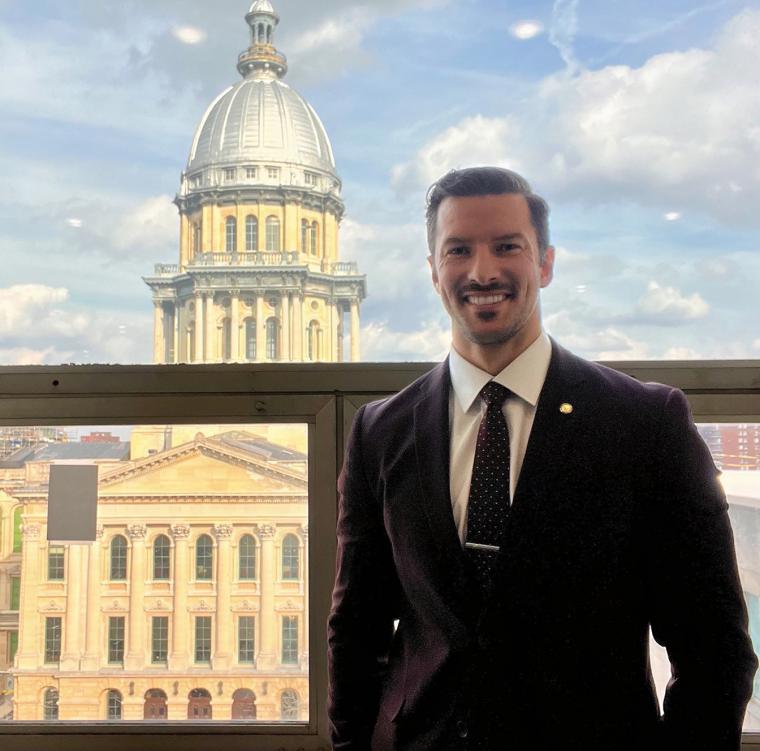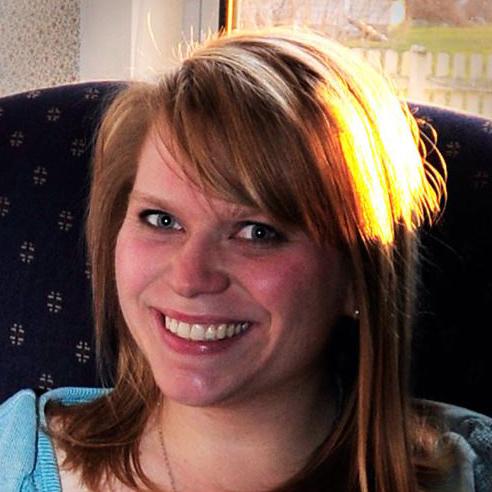
Press spokesperson Jaclyn Driscoll, a 2012 Monmouth graduate, confers with Illinois House Speaker Chris Welch during another busy day in Springfield
MONMOUTH, ILL. (03/18/2024) — It's a little more than a two-hour drive from the Monmouth College campus to the Illinois state capitol in Springfield. And it's a road that many Monmouth alumni have taken for a successful career in state government as "there are Scots working everywhere in Illinois state government."Any such list is headlined by State Senator Mattie Hunter ('76) of Chicago. In 2021, Hunter, who represents the 3rd Senate District, was inducted into Monmouth's Hall of Achievement, the highest honor the College bestows upon its alumni. For a while, Abierre Minor ('20) served as Hunter's chief of staff.
Minor was followed to Springfield by Natalia Garcia ('22), the chief of staff for Representative Mark Walker of Arlington Heights (D-53rd House District), and by Illinois Senate Democratic staff member Halle Majdich ('23).
Older alumni working in the state capital include Rachel Bold ('10), Jaclyn Driscoll ('12) and Tanner Gillis ('16). Bold is an Illinois Senate Republican staff member; Driscoll is the press spokesperson for Illinois House Speaker Chris Welch; and Gillis is the associate research unit manager at the Illinois Commission on Government Forecasting and Accountability.
Checking politics at the door
Bold, Driscoll, and Gillis were asked to provide a positive spin on what can be seen from the outside as a polarizing profession.

Tanner Gillis ('16) is the associate research unit manager at the Illinois Commission on Government Forecasting and Accountability
"In my experience working on a partisan staff, I would say most people, especially staff members, checked their politics at the door," said Gillis. "That's because we all had the same goal and just wanted to produce the best, most effective product possible for whatever constituency we were trying to help."
The goal of Gillis' work at the Commission on Government Forecasting and Accountability is to provide dollars-and-cents information to Illinois state legislators.
"When someone asks a legislator for a cost estimate for enacting a particular piece of legislation, we're the agency that provides them with that cost estimate," he said. "We're also the agency that provides the legislature with the required estimate for the revenues for the coming fiscal year, which they then use when crafting the budget each spring."
Driscoll's responsibilities include advising the speaker, a Democrat who represents the 7th House District. She also oversees external communications with the speaker and senior staff; responds to media inquiries; develops and manages communication plans on behalf of the Office of the Speaker; and prepares the speaker for media interviews and speaking engagements.
"It's exhausting to keep up with battles between the far ends of each spectrum, but what I get to see in my role is that the majority of us fall somewhere in the middle," said Driscoll, who is a former TV and radio news reporter. "Maybe some are a little further to the right or left of center, but when we find opportunities for commonality, a lot of us want much of the same things."

Rachel Bold ('10) has worked for legislative leaders in both the Illinois Senate and Illinois House and has also been a press secretary for the governor
"It's not all nearly as partisan as it looks," agreed Bold, who primarily advises the caucus on media strategy and messaging, but also works on various special projects, including legislative initiatives. "The vast majority of legislation passes with overwhelming support from both sides of the aisle. Those aren't usually the bills that make the big headlines, but I want people to know that as much as it seems like the two parties are always fighting, there's really a lot of collaboration that goes on."
Added Gillis: "I expected the environment of the capitol to be a lot more cutthroat and that everyone would lie and cheat to get ahead, but in reality, none of that was ever tolerated. People would circle the wagons and push out any distrustful individuals. So, honesty and trust are truly hard-earned currencies in the statehouse."
Driscoll agreed that work being done in Springfield for the best interest of the people can be overlooked.
"I wish everyone got the chance to see government up close, rather than through echo chambers on social media or cable news," she said. "I recognize that sitting through a committee hearing or listening to hours of floor debate can be a bit of an acquired taste. But within the four walls of the House chamber, I see deep passion for communities and constituencies, I see advocacy for noble causes that will positively change lives for generations to come, and I get to witness how lived experiences from people of all backgrounds help us create inclusive and transformative policy."
Noble causes
The three alumni have all provided a helping hand toward moving those noble causes along.
"I got to work on the first full-year budget following the budget impasse (of 2015-17), including the first capital projects budget in many years," said Gillis, who prior to joining the CGFA was a policy and budget analyst with Senate Democrats. He staffed the Higher Education Committee and the joint House-Senate Higher Education Working Group, which was formed to address the college affordability and accessibility crisis across the state.
Gillis wrote the AIM HIGH Grant Program that provides $35 million in appropriations to state universities in Illinois to be used for means-tested, merit-based scholarship programs "to discourage out-migration and brain drain" of some of the state's brightest young students.
Gillis was also involved with the need-based Illinois Monetary Award Program. Known as MAP grants, they are available to eligible Illinois residents who attend approved Illinois colleges and universities.
"I helped to initiate a five-year plan to restore and increase MAP funding, resulting in an increase in both the total number of awards, as well as the amount for individual awards," he said. "Statewide, both of these programs combine for $750 million in grants and scholarships."
Bold said a highlight has been getting to see state government "from different angles."
"I've worked both the campaign and state side of things, which was an incredible opportunity to see firsthand how the laws that pass at the Capitol impact people's lives back home," she said. "I've had the chance to work for legislative leaders in both the Illinois Senate and Illinois House, which helped me better understand the unique characteristics of each chamber and how those dynamics impact the legislative process. I also worked as a governor's press secretary, which forced me to look at issues from a statewide perspective. All of those different roles, from intern to senior-level staff, have given me a unique perspective on the process."
Driscoll's biggest win was a more personal one.
"Being selected as the first female press spokesperson for the Office of the Speaker in Illinois definitely tops my list of professional highlights," she said. "It remains one of my greatest honors to serve in this role and to work alongside some of the brightest minds in Illinois."
It's an accomplishment that likely came as no surprise to her favorite Monmouth faculty member, history professor Stacy Cordery.
"Even though she's no longer with the department, I want to emphasize that Dr. Cordery was the most important part of my experience at Monmouth," said Driscoll. "She was someone who inspired me to make my own path, and she helped me understand how strong women can inspire societal change. Dr. Cordery is a big reason why I developed the confidence to pursue dreams I didn't even know I had because I was confined by a patriarchal mentality. She made me believe I was going to be successful, not in spite of being a woman, but because I was one."
The path to Springfield
While some of the Monmouth alumni working in Springfield got there via a major in political science, Driscoll studied in Cordery's field — history.
"I was always a curious child and I loved to learn, especially about history," said Driscoll. "It was at Monmouth College, particularly in any course offered by Dr Cordery, that I developed a true passion for looking at the world and society through a historical lens. As we study history, we get a better understanding of how things change, and we begin to comprehend what causes those changes and how past events impact the world we live in today."
Historical context, she said, is the key to making "better policy decisions. It also gave me a great deal of confidence in developing persuasive arguments that are backed by facts and research, which helps me develop effective communication messages and materials."
Gillis and Bold also paved a path to Springfield through a non-political science major, with Gillis studying biopsychology and chemistry and Bold majoring in communication and international studies.
"I think that made me stand out in interviews," said Gillis. "The experience I received at Monmouth in writing research and doing hands-on research really helped me to understand all parts of the research process. I've found there aren't many differences between the scientific and the legal research process, and you can apply the scientific method to writing new laws."
"The best thing about the approach to education at Monmouth is that beyond any specific subject I studied, what I really learned was how to learn and how to keep learning for my whole life," said Bold. "I genuinely believe that's helped me to be more flexible and adapt to new and changing roles and the evolution of public policy over the years."
The traditional method of gaining employment in the state capital, said Monmouth political science faculty member Robin Johnson, is through an internship program.
"I'm proud to have helped many of these Monmouth graduates with their efforts to gain entry into the Legislative Internship Program," he said. "Monmouth hits above our weight in terms of having an impressive continuing pipeline of students who go through internships and then remain in state government to pursue a variety of careers. We have students serving or who have served in executive, legislative and agency branches under both political parties."
The Illinois Legislative Internship Program, which is more than sixty years old, is a graduate-level internship program that provides recent graduates an opportunity to get directly involved in the legislative process and start a career as a policymaker.
"Monmouth College has a lot of connections in Springfield but seems especially overrepresented in the Illinois Legislative Internship Program," said Gillis.
Johnson makes sure his current students know about his past students' successes.
"From Rachel Bold in 2010 to Halle Majdich last year, it's fun to see them in action as I continue to take students to Springfield every year on class trips," he said. "They, and the other Monmouth grads, serve as inspirations to current students."
And the list doesn't end with the alumni mentioned in this story, said Gillis.
"There are Scots working everywhere in Illinois state government, and this isn't just reserved to political-science majors," he said. "I was a biopsychology major, and one day I was having trouble with my computer and called Legislative Information Services and the woman that showed up to fix my computer was a recent Monmouth graduate named Mikayla Bolton ('19).
"I'm not even the only Monmouth graduate currently working at the CGFA. Our revenue manager, Eric Noggle ('96), graduated from Monmouth with a degree in math."










